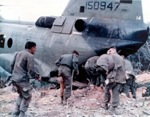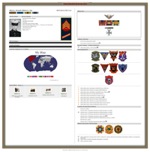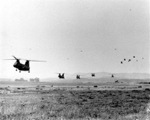An up close and personal interview with Marine Veteran and TWS Member:
Sgt Ronald Winter (1966-1975)
WHAT PERSUADED YOU TO JOIN THE SERVICE?
My father served in the US Navy during WWII and was aboard the USS Princeton in the Battle of Leyte Gulf when it was bombed by the Japanese. My father survived three hours in the water after the ship's magazine exploded, blasting him into the waters of the Gulf.
As a child and teen I regularly heard stories about the war and service. I also learned from my father that we were only the current generation in a long history of service to king and country that went back to the Scottish Highlanders and before them the Vikings - Clan Gunn. It is no wonder that I would serve, and that my service would have something to do with the sea. But the decision to join the Marines was made years before I raised my hand and swore an oath.
In my upbringing all services had their share of heroes and specialists, but the Marines were considered to be elite - the best. I wanted to do something that was more than run-of-the-mill; I wanted to be known as a person who had been challenged to the highest levels and succeeded. The one place where I was sure to encounter challenges that would give me an opportunity to be tested to the utmost, and that I could carry with me the rest of my life, was the Marine Corps.
 |
BRIEFLY, WHAT WAS YOUR CAREER PATH IN THE SERVICE?
I was a freshman in college, with a scholarship, but I didn't have a clear vision of my future and felt that my time in school - at least at that point - was wasted. Due to numerous factors that arose at this time - Fall 1965 - I waited to finalize my enlistment until after the Christmas holidays. I left college, gave up the scholarship, and on Jan. 12, 1966 I left Albany by train with several other recruits, arriving at Parris Island early in the morning of Jan. 14, 1966.
I enlisted for four years with an aviation guarantee, so after Parris Island and a month of infantry training at Camp Geiger in North Carolina, I was sent to the Marine Air Detachment at the Naval Air Station, Jacksonville, FL, for about six months of basic electricity and electronics training. At the end of this training I requested assignment to a helicopter unit, which I believed would give me an opportunity to serve more directly with ground units.
I was assigned to a forming unit at Marine Air Group 26, New River, North Carolina that became HMM-161, which was changing from CH-34s to a CH-46 unit. I stayed in HMM-161 for more than two years, most of that time in North Carolina where I received extensive practical and classroom training on virtually every aspect of the Sea Knight helicopter, including all electrical, electronic, communications and navigation systems. I also was cross trained in electro-hydraulics, power plants and airframes. In 1967 I also began serving as a flight crew member. As my skill levels grew I crewed on test flights where flight was necessary to duplicate problems that were difficult to reproduce on the ground. Eventually I flew in the left seat - co-pilots seat in a helicopter - working directly with the pilot to diagnose and correct systems failures.
DID YOU PARTICIPATE IN COMBAT OPERATIONS?
In early 1968 our unit received word that we would be going to Vietnam in the summer. But the Tet Offensive erupted and our departure date was moved up several months. During this time the squadron asked for volunteers to fly gunner. I was selected and went through a training period on the M-2, .50 caliber machine gun. We were given instructions on the components, assembly and disassembly, cleaning and maintenance at the squadron then went to the ground range at Camp LeJeune to become proficient at firing from fixed positions. This was followed by flight training on the coast, where empty propane-type fuel tanks were set up as targets. We learned to fire from different altitudes, at different speeds, and different wind conditions. I loved flying gunner and I loved shooting that machine gun.
We arrived in mid-May 1968 and immediately began flying in support of operations combating the "Mini-Tet" offensive. My first combat assignments were at LZ Torch, south of Khe Sanh where the 4th Marines were blocking off infiltration routes from the Ho Chi Minh trail. I was directly engaged with the NVA on these flights, and also flew medevac missions out of Khe Sanh. Although the base was being quietly dismantled, the media back in the world reported that it was being closed and the NVA retargeted its guns in Laos on the base. My first medevacs were to bring wounded Marines from Khe Sanh back to medical facilities and occasionally the Sanctuary and Repose hospital ships. Over the remainder of my 13 month tour I flew a total of 300 combat missions, most in northern I Corps along the DMZ and Laotian border, but also in southern regions including The Arizona, Dodge City and the Batangan Peninsula south of Chu Lai. At one time or another, during these 300 missions, I flew with virtually every Marine infantry unit that was serving in Vietnam.
FROM YOUR ENTIRE SERVICE CAREER WHAT PARTICULAR MEMORY STANDS OUT?
In April 1968, HMM-161 left New River, North Carolina for a cross country flight to MCAS El Toro in California and from there to Vietnam. We flew all 24 of our helicopters across the US, arriving in three flight days, a feat that had never been done before and I don't believe has been done since. I served as a crew member on Yankee Romeo 39, and saw the south, the Mississippi, the plains, the deserts and the Rocky Mountains all from the open cabin of a CH-46. I sat next to, or sometimes rode astride of, a huge internal fuel tank that extended our range and reduced refueling stops. On the last day we crossed into Southern California, flew to the coast and turned north toward L.A. Until that morning we flew in flights of four, but all of the squadron joined for the final flight and as we headed north our helicopters maneuvered into a formation spelling 161 in the air! We weren't very high, and weren't going very fast so it caused quite a stir on the ground as the noise of 24 CH-46s hit the towns and cities below us. We flew over El Toro then broke formation and spiraled in. Our advance party on the ground said it was a sight to behold.
From there we boarded the USS Princeton, the one that was built to replace the carrier my father served on, and we embarked to Vietnam. We rode out a typhoon in the Pacific, and my commanding officer Lt. Col. Paul Niesen, landed his helicopter in the ocean one morning to successfully rescue a sailor who had fallen overboard. I was so proud to be part of that squadron, and that moment in history.
WHICH INDIVIDUAL PERSON FROM YOUR SERVICE STANDS OUT AS THE ONE WHO HAD THE BIGGEST IMPACT ON YOU...AND WHY?
Two Marines together had the biggest impact on my tour of duty: Sgt. Robert F. Starbuck, one of my drill instructors at Parris Island; and Colonel Niesen. Both men exemplified the very best definition of the word "Marine." Sgt. Starbuck, a Recon Marine, was awarded the Silver Star posthumously for extraordinary bravery in combat in Vietnam. Col. Niesen was named Marine Aviator of the Year in 1969 for the many accomplishments HMM-161 achieved under his command in 1968. Both of these Marines were so inspirational, their personal devotion and examples of leadership were so clear that I see Col. Niesen's influence as a continuance of the lessons I learned from Sgt. Starbuck at Parris Island.
WHAT PROFESSION DID YOU FOLLOW AFTER THE SERVICE AND WHAT ARE YOU DOING NOW?
I am a writer, author of two books Masters of the Art, A Fighting Marine's Memoir of Vietnam, now in paperback from Random House. Also, Granny Snatching, How A 92-Year-Old Widow Fought The Courts and Her Family to Win Her Freedom, due out March 1, 2010 by Nightengale Press. Both are non-fiction. I also write a regular blog column on my website www.RonaldWinterbooks.com, about the military and politics. I own a small business, Spectre Communications specializing in media relations and political strategy/communications. I am Director of Eastern Operations for Michael J. London & Associates PR firm in Trumbull, CT, and work as an adjunct professor of communications at the University of Hartford.
HOW HAS SERVING THE ARMED FORCES INFLUENCED THE WAY YOU HAVE APPROACHED YOUR LIFE AND CAREER?
Two words: with confidence. I didn't realize it early on, but after my service ended and I embarked on a civilian career, I was far, far ahead of my peers who did not serve in the military. I returned to college after Vietnam, earning degrees in Electrical Engineering and English Literature. I spent 20 years in the print news business where I received numerous awards and was nominated for a Pulitzer. The biggest difference I noticed between my approach and others who had not served, was that I was always confident when taking on a new assignment or handling a new responsibility. I knew I could do the job, and do it well. When I covered a particularly heinous shooting, involving two little children, a co-worker who was assigned to write a "color sidebar" to accompany my main news article, had no idea how to proceed. I wrote my article, and then dictated the lead paragraph to her article, which got her going in the right direction. She later asked me how I was able to do it so quickly. I answered, "Because the world will still spin, the sun will still come up, and if you don't file on time, the editors will find something else to fill your spot in the paper. Besides, no one is shooting at me." She looked at me as if she didn't believe me until someone else told her I meant it. I think she understood then. I took this same approach to being a parent and now a grandparent. I know that I DON'T know everything about everything. But I know I can LEARN what I need to do the job correctly, and from that standpoint I feel confident that I can handle whatever comes my way.
HOW HAS TOGETHERWESERVED.COM HELPED YOU TO MAINTAIN A BOND WITH THE SERVICE AND THOSE YOU SERVED WITH?
First I have been able to link up with legions of fellow Marines who served where I served, when I was there. This includes training at Parris Island, New River and on to Vietnam and virtually everywhere else I have served. I have made innumerable friends, both through scanning the forums and commenting on posts that interest me, through my brothers and sisters, and through thousands of other members scanning my profile page. From a business sense I receive numerous and regular hits on my website from TWS links, and I regularly sell books to people who found me through TWS. Dozens were sold last Christmas alone as gifts from Marines who wanted their families to learn what life in the Corps was like when they served. I am humbled and gratified by this constant support for my writing, particularly from those who were there and saw what I saw. I also have great conversations with Marines and corpsmen (that's CORE MEN Mr. President) who share my political views, and occasionally from some who don't. I enjoy the conversations and I also enjoy just reading the posts. We have so many forums of interest and so many people who share our interests. I can discuss Scotch whisky, Dominican Republic cigar tobacco, or just get a new recipe for grilling ribs, all on the same website. From the standpoint of social networking, TWS has become a regular part of my daily life. I sign on virtually every day, have a conversation, find a new friend or an old one, and come away feeling that my connection to the Marine Corps is truly lifelong.
|

Sgt Ronald Winter

View Sgt Ronald Winter's Shadowbox on TWS

HMM-161 Air Operations in Vietnam

HMM-161 Arriving at El Toro
|